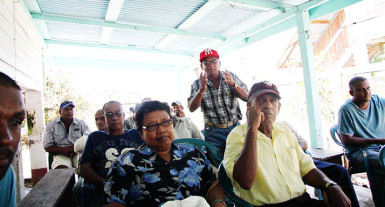President David Granger’s address in July to a rice forum at the Arthur Chung Convention Centre appeared designed to lift spirits in a sector that has had to absorb the shock of Venezuela’s earlier announcement that Guyana could no longer rely on that country’s rice market under the PetroCaribe Agreement. The sector, Granger declared was going through “a challenge” rather than “in crisis” and that the country’s most successful agricultural endeavour was simply “too big to fail.” It was an attempt to talk up the rice industry which, situated as they are in the eye of the storm, rice farmers on the Essequibo coast can be forgiven for taking with a pinch of salt.
While only a single farmer openly declared that he did not share the President’s upbeat perspective on the rice industry, last Wednesday’s meeting at Reliance, convened to allow for a report on the previous Friday’s meeting of members of the newly constituted Guyana Rice Develop-ment Board (GRDB) bared the collective sense of anxiety as to just what would be the fate of their respective livelihoods, going forward.

Not for the first time the Stabroek Business had been allowed access to a meeting of Essequibo rice farmers, which in the recent past, used to be taken up with protestations against what some farmers said were politically-driven pressures that sought to strangle Essequibo’s rice economy and what some felt were the not unconnected protracted delays in receiving payment for paddy sold to the millers.
The problem of less than timely payment for paddy persists. Overall outstanding amounts totalling hundreds of millions were volunteered to this newspaper. In fact, quite a few of the farmers now appear to have drawn a line in the sand, declaring that if payment for the paddy yield for the crop due to be harvested next month is not more timely and if the minimum price they receive falls under $3000 per bag they would probably get out of the industry altogether.
It is, however, difficult to take the threat at face value. Rice is embedded in the livelihoods and the economies of these people. If there is some evidence of alternative farming pursuits these do not come even remotely close to matching the size of the pursuits in rice; nor is there any persuasive evidence that the rice industry on the Essequibo Coast has moved any closer to the option of diversification into value-added pursuits that has been urged upon the sector for years.
What now appears to be the end of the PetroCaribe era has exposed the sector to the rigours of a challenging global rice market.
With the Venezuela market now due to dry up completely in a matter of weeks, the muted ‘bad blood’ between the farmers and the millers is becoming more evident. Late payments have been the bane of the farmers’ existence. The Factories Act dictates that farmers be paid a minimum of 50 per cent of the cost of their paddy within two weeks of delivery to the millers. The remaining amount must be paid no later than 42 days thereafter, failing which the miller becomes liable for interest on the debt at a rate that is 2 per cent above the bank rate. The farmers want the GRDB to ensure that the requirements of the Act are followed. The millers say that payment delays are inevitable in circumstances where the market can be slow.
But the problem does not end there. The controversy between the two sides has long drifted into issues of trust and politics. In the matter of trust many of the Essequibo farmers say that late payments on the part of the millers is not just a matter of liquidity but a deliberately contrived scheme to better position the millers (than the farmers) to ride out the tough times. The politics, they say, has to do with a ‘policy’ on the part of the previous political administration to victimize those farmers whose political support could not be relied upon.
Both Naith Ram and Jinnah Rahaman ‘double’ as rice farmers and vocal political activists who make no secret of the fact that they welcome the advent of a new political administration. Like many of the other worried rice farmers on the Essequibo coast they are looking to the new administration to seek to transform the fortunes of the sector as quickly as possible and the announcement in last Monday’s budget presentation that the government will be granting a range of concessions to the gold mining sector appears to have triggered calls here for similar gestures to be made to the rice industry.
What is evident about the preoccupation with the challenges facing the rice industry here in the Essequibo coast is the collective sense of awareness and anxiety that the issue has triggered across communities and households. Once the circulation of money begins to slow on account of delays in paddy payments, the absence of liquidity impacts along a long line of the farmers’ creditors that range from the community groceries to the dealers in high-priced spares. That way, the entire community has a vested interest in the industry.
The new administration has already been making some of the right noises about the rice industry including the need to develop a more aggressive marketing programme and the importance of fashioning a diversification programme for the sector. The problem is that while the farmers, with their new, more militant representatives on the Board, say that they intend to nudge government more energetically on the matter of finding new markets, there are few signs if any that they are prepared to take what will be a significant leap into serious diversification.




